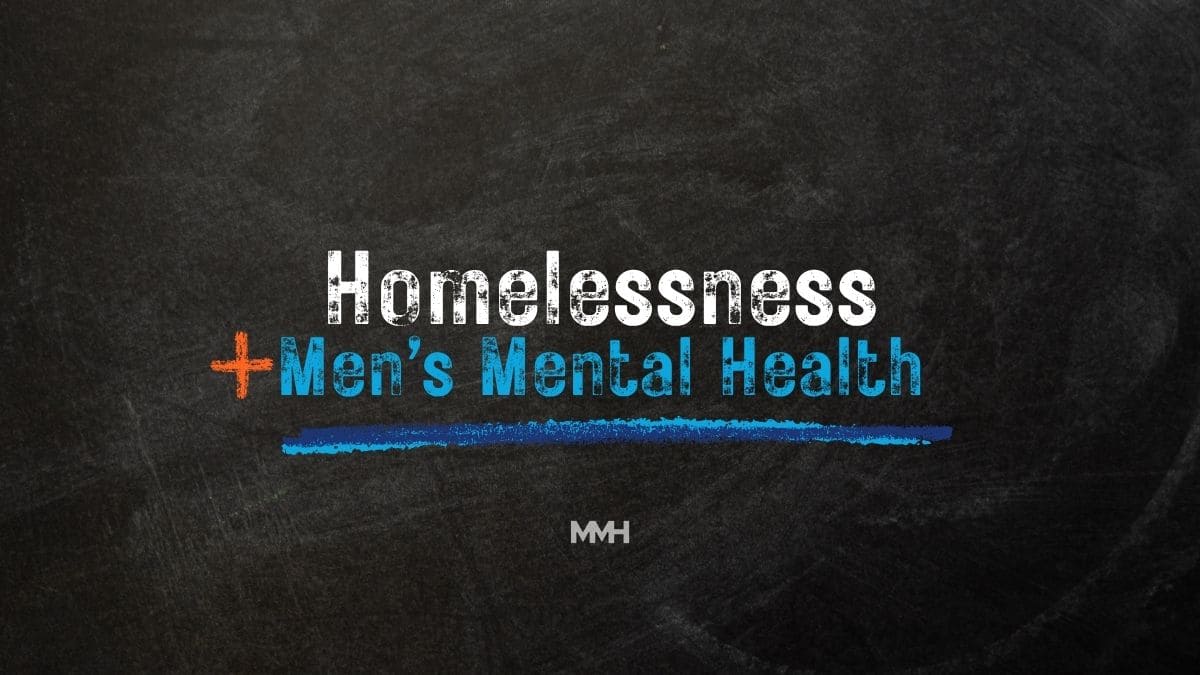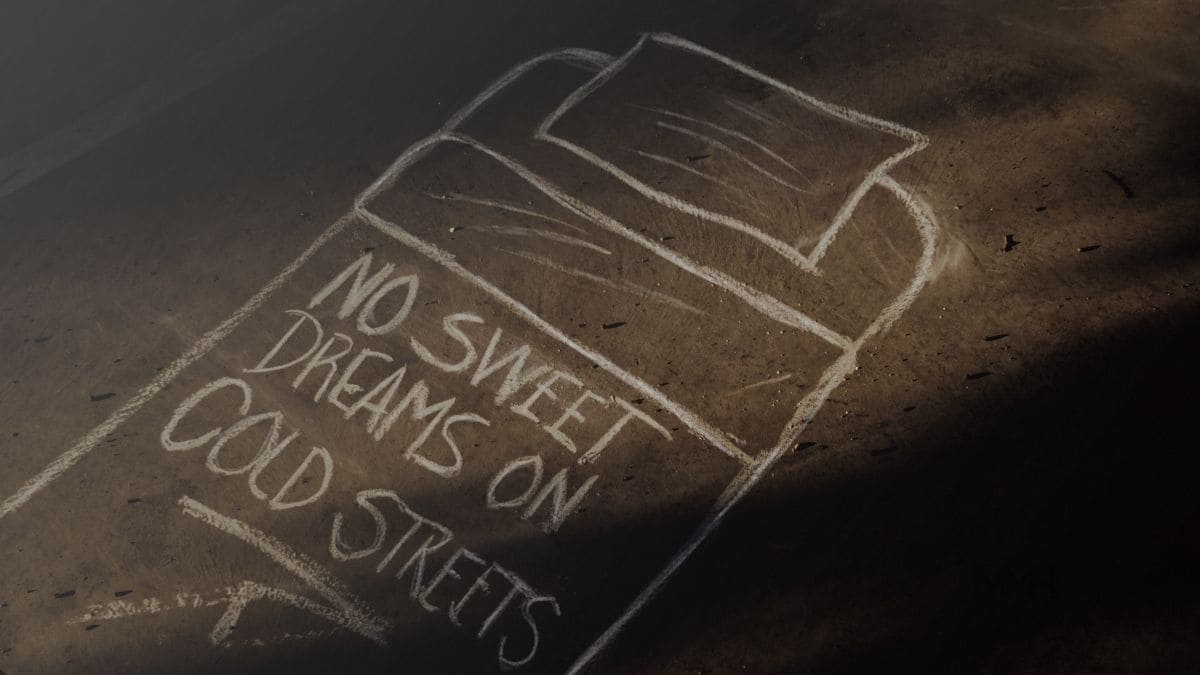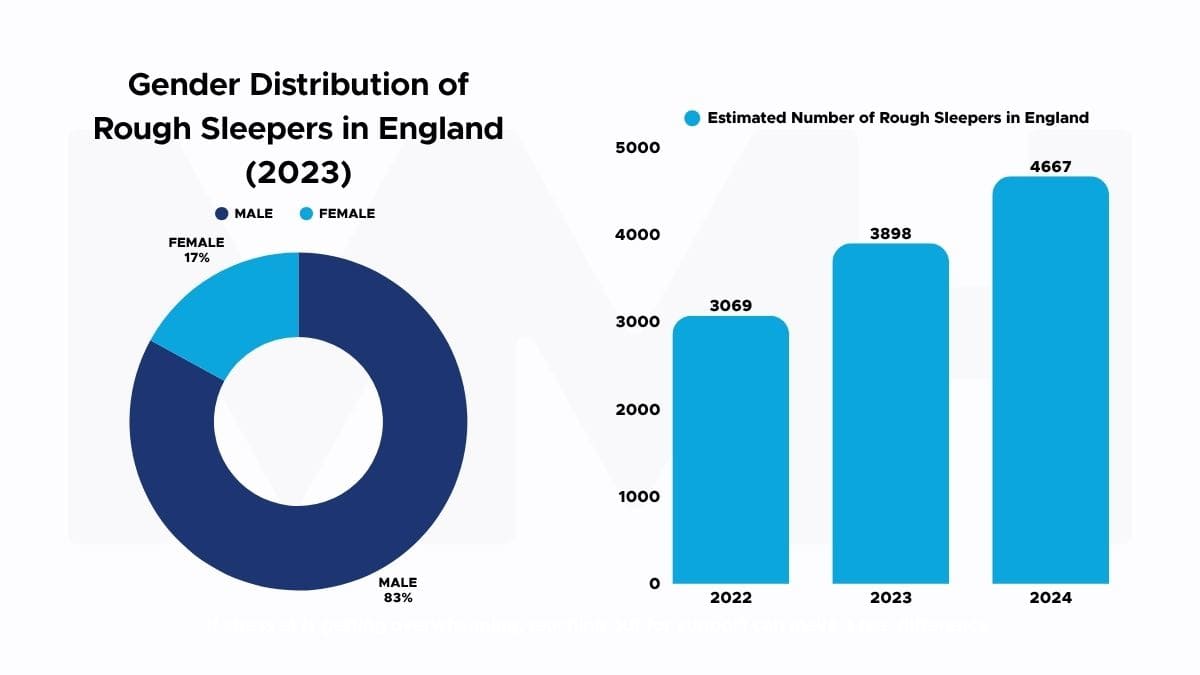MMH Men’s Mental Health does not provide direct mental health support. We do not offer crisis intervention, therapy, counselling, or medical advice. Instead, we provide information and signposting to external services that may be able to help.
Homelessness
Feeling overwhelmed? You don’t have to go through this alone—help is available.
Need to talk?
Samaritans are here to listen, 24/7, 365 days a year. You can call them for free on 116 123 or visit www.samaritans.org
Prefer to Text?
Shout is a free, confidential, 24/7 text messaging support service for anyone who is struggling to cope.
If you feel in danger please call 999 or go directly to emergency services.
Homelessness: The Big Issue for Men’s Mental Health
Homelessness is far more than just losing a roof over your head; it rips away stability and can have devastating effects on a man’s mental and physical health. For many, it stems from deeply personal crises like job loss, relationship breakdowns, or struggles with addiction, leading to overwhelming feelings of insecurity, stress, and profound isolation.
📌 Without a stable place to call home, it becomes incredibly difficult to find steady work, access vital mental health support, or escape the grip of financial struggles. This creates a cycle that, for many, can feel impossible to break.
If the experience of homelessness is affecting your mental well-being, sense of safety, or hopes for the future, understanding its roots and wide-ranging impacts is a crucial first step towards finding your way through these challenges.

What is Homelessness?
Homelessness means much more than just not having a stable or secure place to live. It covers various difficult situations, including:
- 🔹 Rough Sleeping – Living on the streets without any shelter.
- 🔹 Temporary Accommodation – Staying in places like hostels, shelters, or emergency housing, often with no certainty about tomorrow.
- 🔹 Sofa Surfing – Constantly moving between the homes of friends or family members, never having a permanent base.
📌 Homelessness isn’t simply about lacking a physical home; it’s about the profound loss of security, stability, and access to essential support and services.
For many men, the societal pressure to “cope” on their own makes it incredibly difficult to ask for help, pushing them deeper into mental health struggles and isolation.

What Causes Homelessness in Men?
Homelessness is rarely caused by just one factor; for men, it often emerges from a devastating combination of personal, social, and economic challenges:
- 🔹 Financial Hardship – Sudden job loss, overwhelming debt, or unexpected medical expenses can quickly lead to losing the very roof over one’s head.
- 🔹 Relationship Breakdown – Separation, divorce, or severe family conflict can suddenly leave men without a place to live, often compounding feelings of isolation.
- 🔹 Mental Health Issues – Untreated conditions like depression, anxiety, or PTSD can make it incredibly difficult to maintain a job, manage finances, or keep stable housing.
- 🔹 Addiction – Struggles with substance abuse can both contribute to and be made far worse by homelessness, making the journey to recovery profoundly harder.
- 🔹 Domestic Violence – Tragically, men can also be victims of domestic abuse, forced to leave unsafe homes and finding themselves without shelter.
- 🔹 Systemic Issues – Broader challenges like a dire **lack of affordable housing, critical gaps in social support, or immense difficulties after leaving prison or military service** can significantly increase a man’s risk of homelessness.
📌 Understanding these complex, often interlinked causes can truly help us break the cycle and encourage men to find the specific, compassionate support they need.

How Homelessness Affects Mental Health
The experience of homelessness and mental health are tragically intertwined, often creating a painful cycle where one worsens the other.
🟠 Psychological & Emotional Effects
- Chronic Stress & Anxiety – The relentless uncertainty of where to sleep, find food, or even access basic help creates a state of profound and constant stress and anxiety.
- Depression & Hopelessness – A deep sense of depression and overwhelming hopelessness can set in, leaving many men feeling utterly worthless or trapped with no discernible way out.
- Emotional Overwhelm – Navigating the crushing weight of daily struggles without any stable support can lead to intense emotional overwhelm, deep frustration, and profound despair.
🟠 Behavioral Effects
- Social Withdrawal – The profound isolation from friends, family, and crucial support networks makes it incredibly challenging to ever begin rebuilding one’s life.
- Substance Use – In an attempt to numb the relentless emotional pain and stress, some men tragically turn to alcohol or drugs as a desperate coping mechanism.
🟠 Physical Health Consequences
- Sleep Deprivation – Living in unsafe and noisy environments makes it virtually impossible to achieve restful sleep, leading to debilitating exhaustion that impacts everything.
- Increased Health Risks – The severe lack of consistent medical care, poor nutrition, and constant exposure to harsh weather conditions can drastically worsen existing health issues and create new ones.
📌 The very mental health struggles brought on by homelessness can tragically make it even harder to reach out for help, tightening the grip of the cycle. Yet, it’s vital to remember that compassionate support is indeed available.
🚨 While homelessness is an incredibly difficult situation, it is never a life sentence. Hope and help are truly out there, and taking that courageous first step toward support can begin to open the door to stability and genuine recovery.
Explore More
Homelessness and Housing
- Shelter Shelter is a national housing charity that provides free advice and support for people who are homeless or at risk of losing their homes. They offer legal guidance, emergency housing assistance, and financial advice.
- Crisis Crisis focuses on helping homeless individuals find long-term housing solutions and offers support for employment, education, and mental health. They run various programs aimed at ending homelessness for good.
- Centrepoint Centrepoint specializes in supporting young people (aged 16-25) who are homeless or at risk of homelessness. They offer housing, education, and mental health support.
- P3 Housing Working alongside people to exit the streets, access settled long-term accommodation and get their lives back on track. Outreach teams are located in Derbyshire, Gloucestershire, Warwickshire and Wolverhampton.
- The Salvation Army The Salvation Army provides emergency shelters, drop-in centers, and long-term accommodation for homeless men. They also offer rehabilitation programs for those struggling with addiction or mental health issues.
- StreetLink StreetLink is a service that enables members of the public to connect people sleeping rough with local services that can support them. If you see someone sleeping rough, you can use StreetLink to report their location and get them help.
While we aim to provide accurate and updated information, MMH Men’s Mental Health is not responsible for the quality, accuracy, or availability of external services linked on this page. If you notice a broken link or have a resource to suggest, let us know.
Simple Actions That Can Help You Feel Better
You don’t have to do everything at once. Start with one step and build from there.
If your struggles persist or affect your daily life, consulting a professional is recommended.
Reach Out to Local Services
Connect with Homelessness Charities
Charities like Shelter, Crisis, and Centrepoint offer practical support, including finding temporary accommodation, securing benefits, and providing access to mental health services.
Access Mental Health Support
Many men experiencing homelessness struggle with mental health issues. Contacting mental health services through the NHS or a charity can help address these problems and provide vital emotional support.
Seek Financial and Legal Advice
If you’re struggling to pay rent or facing eviction, organizations like Citizens Advice can provide guidance on managing debt, accessing benefits, or negotiating with landlords.
Work on Long-Term Solutions
While finding immediate shelter is critical, it’s also important to focus on long-term stability. This may include job training programs, addiction recovery services, or securing permanent housing through government programs.
You Are Awesome.
Your mental health matters, and so do you.
Take the next step:
Need to talk?
Samaritans are here to listen, 24/7. You can call them for free on 116 123 or visit www.samaritans.org
Prefer texting?
Shout offers free, 24/7 confidential support. Text ‘SHOUT’ to 85258 to start a conversation or visit
www.giveusashout.org
Explore More
Looking for guidance? Browse external resources on mental health, self-care, and well-being.
Support Groups
Find connection. Join an external support group and connect with others who understand.
